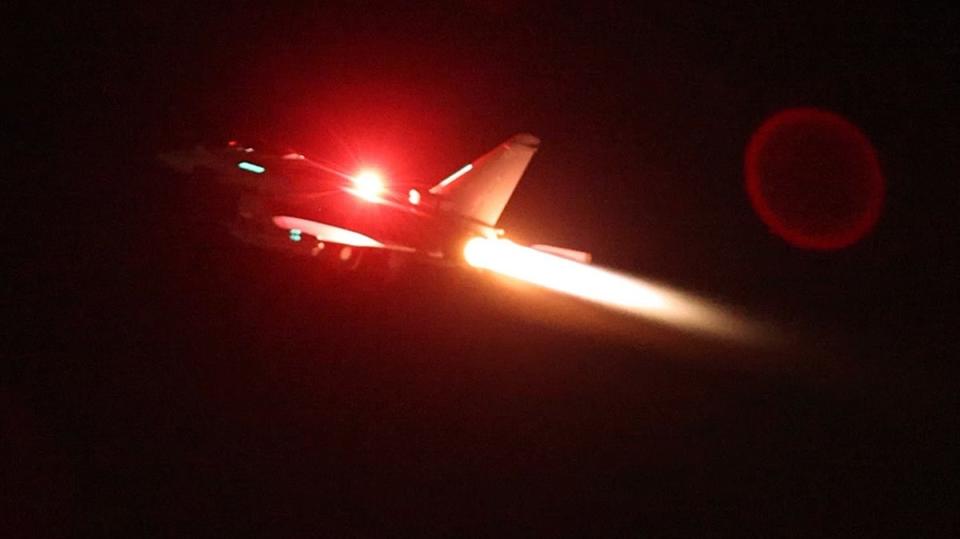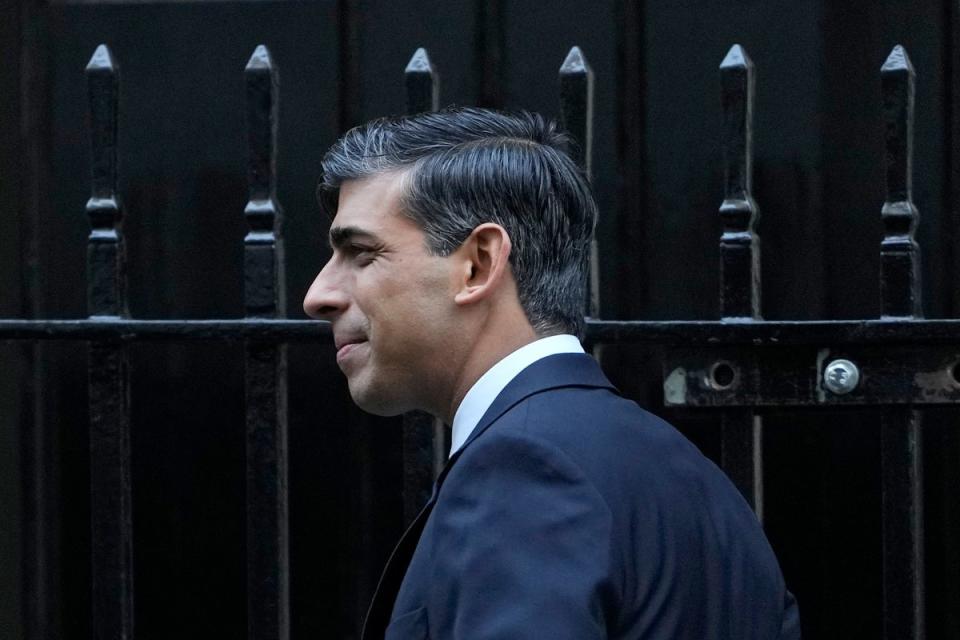Sunak says Yemen strikes were self-defence amid row over not consulting parliament
- Oops!Something went wrong.Please try again later.
- Oops!Something went wrong.Please try again later.
Rishi Sunak has said strikes on targets linked to Houthi rebels in Yemen were “self-defence” to protect shipping lanes, as the PM faces a backlash over his decision not to consult parliament.
Labour leader Keir Starmer has said he supports the strikes – but demanded a Commons statement “at the first opportunity” and a summary of the government’s legal position today.
A political row has erupted over the PM’s failure to seek approval of parliament for the strikes – despite briefing the Labour leader ahead of time and holding a late-night cabinet meeting.
The Lib Dems’ foreign affairs spokeswoman Layla Moran said it was “shameful” for Mr Sunak to bypass parliament. The SNP and some Labour MPs have also demanded the recall of the Commons.
Overnight the RAF launched strikes against military facilities used by Houthis rebels in Yemen, the PM confirmed, saying the UK will “always stand up for freedom of navigation and the free flow of trade”.
It follows weeks of warnings to the group since it started targeting shipping in the Red Sea late last year. Mr Sunak said the Iran-backed rebels “reckless actions” were risking lives at sea.
A joint statement from countries including the UK and the US said the action had been taken “in accordance with the inherent right of individual and collective self-defence”.

The PM said: “Despite the repeated warnings from the international community, the Houthis have continued to carry out attacks in the Red Sea, including against UK and US warships just this week.”
The Tory leader said the Houthis actions “cannot stand”, and that his government had decided to take “limited, necessary and proportionate action in self-defence” alongside the US.
The PM also said the targets hit were tied to the Houthis’ recent attacks and were aimed at degrading “Houthi military capabilities and protect global shipping”.
Mr Sunak’s armed forces minister James Heappey played down concerns about the danger of escalation in the Middle East after criticism from Russia.
The defence minister told BBC Breakfast that “allegations of escalation from the Kremlin always ring hollow”. But he conceded that there could be “nervousness” in the region.

Mr Sunak told his cabinet on Thursday evening that he was preparing to launch strikes, and – in an unusual move – the government also briefed Sir Keir and shadow defence secretary John Healey.
Sir Keir said Labour was “supporting” the targeted strikes, but called for a statement in parliament “at the first opportunity”.
The Labour leader told BBC Radio 5 Live: “Clearly the Houthi attacks in the Red Sea have to be dealt with, their attacks on commercial shipping, attacks on important trade routes and putting civilian lives at risk and therefore, we do support this action.”
But Sir Keir said Mr Sunak’s government must now “set out the justification, to set out the limits and scope of the operation”.
The Labour leader also said he wanted to see a summary of the government’s legal position “published as soon as possible, and I would hope that that can be published today.”

Labour’s shadow defence secretary offered support for the government in striking without the approval of parliament. Mr Healey told Sky News: “We accept that the timing was not in the hands of the UK government.”
Other opposition parties expressed their frustration. The Lib Dems’ Ms Moran said a vote in parliament should be “vital” for any attack, while SNP leader Humza Yousaf said MPs must be given the chance to scrutinise such a move.
The Commons Speaker cannot recall parliament without being asked to do so by the government, and Mr Sunak is not expected to make such a request.
The Ministry of Defence (MoD) said four Royal Air Force jets struck two Houthi facilities involved in their targeting of HMS Diamond and US Navy vessels on Tuesday. One was a site at Bani and the other the Abbs airfield, used to launch drones and cruise missiles.
The US Air Force said it struck more than 60 targets at 16 sites in Yemen. The UK and US had non-operational support from Australia, Bahrain, Canada and the Netherlands.
The MoD said early indications are the strikes dealt a “blow” to the Houthis’ ability to threaten merchant shipping in the Red Sea. But the militants said the strikes would not prevent them from continuing their attacks.
The government is thought to fear the British economy could shrink in the face of ongoing attacks in the Red Sea, through which some 15 per cent of the world’s shipping passes.
The Treasury has modelled scenarios, such as crude oil prices increasing by more than $10 a barrel and a 25 per cent rise in natural gas, according to the BBC.
Lord Ricketts, who served as the UK’s first national security adviser, said strikes against the rebels were “necessary” and “inevitable” after demands and warnings were ignored by the Houthis.
He told BBC Radio 4’s Today programme: “I think the final straw was that very complex and dangerous attack on the naval task force itself a couple of nights ago, I think at that point they couldn’t allow this to continue.”
Lord Ricketts warned that the conflict in the Red Sea was “already having a major disruptive effect on this big maritime artery which carries 20% of all the world’s container traffic, as well as a lot of oil and gas exports”.

